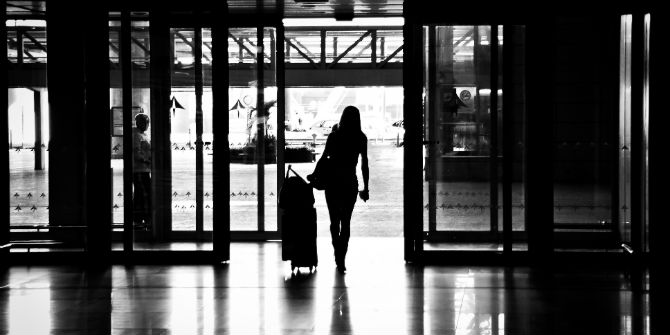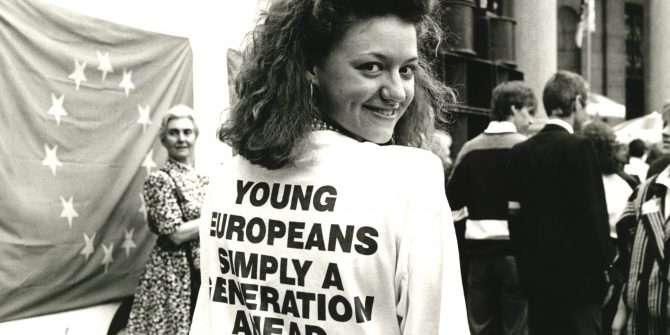The new ‘Australian-style’ points system for migration is a policy founded on emotion rather than economic reality, write Paul James Cardwell and Sylvie Da Lomba (University of Strathclyde). It will not simplify the immigration regime and will leave businesses struggling to fill shortages.
Was Brexit about immigration? For a short time after the referendum, Brexiters such as Daniel Hannan claimed that it was not. But the emphasis quickly placed by Theresa May and subsequently by Priti Patel on ending free movement ‘once and for all’ as a red line has made the post-Brexit period at least as much about immigration as anything else.

The government’s long-awaited new ‘Australian-style’ points-based post-Brexit immigration system has now been revealed. The policy statement – not an actual White Paper – unequivocally presents the new system as a core element of the government’s ‘getting Brexit done’ strategy; it is about ‘’taking back control of UK borders”. Despite abundant evidence that free movement has benefited the UK, the statement sets out clearly that the immigration system has been ‘failing’ as it has been ‘distorted by free movement rights’. There is no mention that the same free movement rights have been used by UK citizens – rights that the UK government is happy to sacrifice in any future agreement. May’s insistence that ‘we will always want immigration from Europe’ appears also to have been jettisoned.
The new measures are put forward as a means of ensuring fairness, equal treatment and straightforwardness. EU citizens (characterised in the statement as ‘cheap labour from Europe’) will no longer be able to come to the UK unless they conform to the requirements of the new (but not actually new) points-based system.
However, principles of fairness and equal treatment are a difficult sell when the deliberate policy is to make life harder for large categories of (even highly skilled) people to come to the UK, rather than make migration policy clearer and fairer for all. The ‘hostile environment’ might have originally only been intended for those in an irregular situation, but we know that it permeates the ethos of a post-Brexit policy where (again, in the words of the policy statement) the ‘needs of British people’ come first. As far as simplicity is concerned, anyone who looks at an immigration law handbook will see by the sheer volume that it is anything but simple – and the new policy will not change much about that.
Whilst every national migration policy across the globe is designed to satisfy domestic needs, there is nevertheless a difference in perception of what those needs are – and whose needs. The reaction of business to the new proposals is, predictably, to point out how hard it will be to recruit in the sectors that need people from outside more. Rapid shifts in immigration policy do not allow for adjustments – an argument that there are X numbers of unemployed (or the misleading ‘economically inactive’) British people to fill potential vacancies does not take into account where those vacancies are, or what the skills required are. This was explicitly recognised in the Scottish government’s recent attempt to have a specific Scottish visa, particularly for the depopulated rural areas that would not meet high salary thresholds. That proposal was rejected outright by the UK government. Moreover, an unrealistic timeframe – the new system is due to take effect from 1 January 2021 – makes ‘glitches’ unavoidable. And, as we have seen with both the EU Settlement Scheme and the Windrush scandal, ‘glitches’ have real consequences for people’s lives.
Unsurprisingly, no heed is given to the views of migrants. Instead, the government assumes that a rebalancing towards attracting ‘global leaders and innovators’ and ‘investment in technology and automation’ will make the UK compellingly attractive to the world’s ‘brightest and best’. In addition to raising concerns about brain drain, this claim does not account for the fact that the UK is not the only country chasing after the ‘brightest and best’. It might well be the case that non-EU migrants might still want to come to the UK, but there is no suggestion that migration requirements will be eased for this group of migrants. As for EU migrants, they might be well put off by having to face the full force of the UK’s immigration system. These non-EU citizens starting out in their careers are unlikely to meet the necessary thresholds, even if educated in the UK.
Interestingly, whilst free movement is clearly identified as THE problem, the policy statement assumes that EU citizens already present in the UK stay through the EU settlement scheme. The statement notes that this workforce will have its uses – they can fill potential shortages. Yet alarm bells are already ringing across sectors of the economy (including the care sector) – there will not be enough EU settled migrants to fill these shortages.
Given the political capital invested in getting Brexit done, it seems that the proposals are a response to emotions rather than economic reality. This attempt to satisfy those who believe that (a) the system does not work (b) the UK is ‘a soft touch’ (c) Europeans have it ‘too easy’, will only be successful if the government addresses all the ills attributed to immigration – a low wage economy, social and health care crisis, lack of social housing are addressed by this government – before the next general election. Yet an immigration system borne out of Brexit rhetoric and built on fears about immigration is more likely to compound these problems than foster prosperity for all across the UK. And how then will the system be further reformed to satisfy the constituency of people who want migration reduced?
This post represents the views of the authors and not those of the Brexit blog, nor LSE.







All my instincts and inclinations are in line with the profound misgivings expressed here about the government’s approach to immigration. However it behoves us not just to object but to propose alternatives. I think freedom of movement within EU countries which, despite national differences, share so much in terms of values and standards was practicable and beneficial but at the end of 2020 it will be gone. What then? No-one seriously suggests that we simply extend freedom of movement to the whole world. Indeed that would be a rather strange reaction to the obvious truth that worries about mass immigration were a major factor in the “leave” vote. So what exactly do we do? Since I find it very difficult to answer that question myself I would greatly welcome a follow up paper to this one which at least addresses this crucial point.
Good to see a constructive comment from a Remainer.
I would suggest that there is an opportunity to take in more refugees.
I have two observations to make. First, I personally feel our country is ill-served by the present crop of leaders. I say this in all humility as I am myself an immigrant, who was fortunate enough to be folded into Britain as a citizen. My personal fortunes are closely intertwined with the fortunes of the UK; for if she were to miscarry as a democracy, my fortunes will sink with hers, and I will have no country to call home.
Second: It has been found that if a great event is to be kept in mind in succeeding ages, there must be some memorial of it. Men by degrees forget it, and even come to be dubious as to whether such an event did occur. Immigrants coming to Britain after WW2 was a major event. The absence of some memorial marking this event appears to have dulled the collective memory of the country; for immigrants were instrumental in rebuilding the British economy after a devastating war. And, if immigrants were needed in those dark days following the WW2, the UK most certainly needs them today, especially now that Britain is an aging country. Ms Priti Patel’s immigration proposals do not bode well for the citizens of the United Kingdom of Great Britain.
“It might well be the case that non-EU migrants might still want to come to the UK, but there is no suggestion that migration requirements will be eased for this group of migrants.”
The newspapers tell us that the salary threshold has been lowered. Are they wrong?
In fact Brexit was about ‘taking back control’ of this country’s borders but of myriad other matters, legal, financial, foreign policy, as well. Taking back control related to eu corruption, accounts qualified every year for twenty years, its partial and politicised judiciary, its lack of democratic accountability and its cronyism, ‘behind closed doors’ appointments, lacking due process, to senior positions.
This country has welcomed over 12 million people net over the last twenty years or so, at an obvious cost to healthcare, housing and infrastructure. A widespread groundswell against further swingeing increases without supporting provisions in these areas is entirely understandable, even inevitable. Nevertheless we still and will still welcome more tens of thousands of the world’s citizens every year; long may we continue so to do.